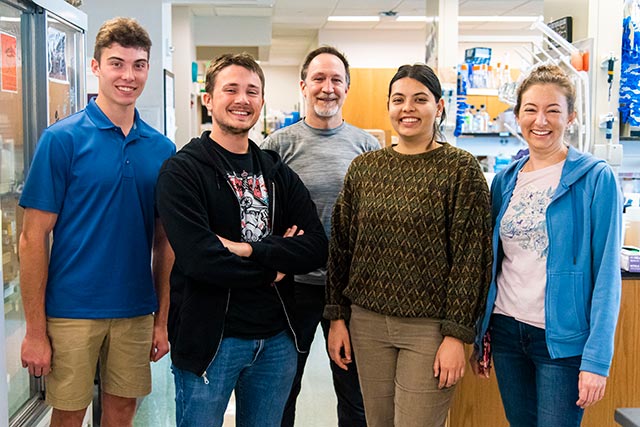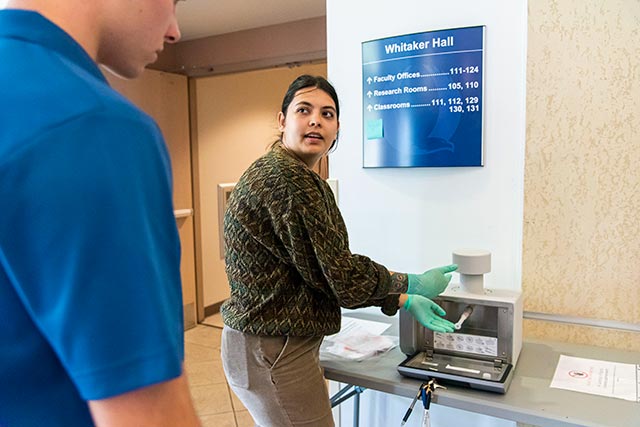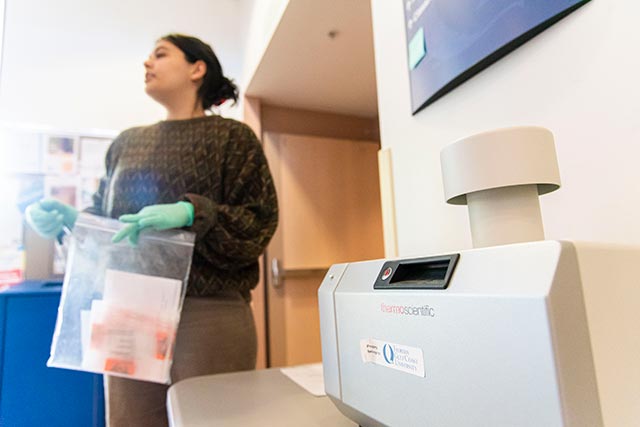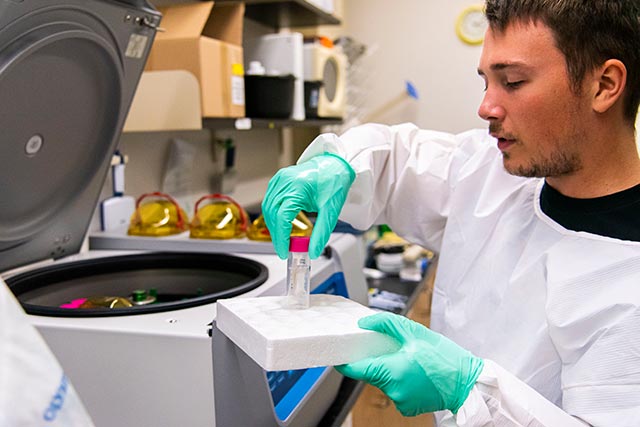Known worldwide for his expertise in virology, Dr. Anthony Fauci became a household name during the coronavirus pandemic. That’s why it’s special that a team of Florida Gulf Coast University researchers got to present their work to him.

Fauci hosted the Keystone Symposia on Molecular and Cellular Biology in Snowbird, Utah, from April 10-13. The conference topic was “Lessons from the Pandemic: Responding to Emerging Zoonotic Viral Diseases,” and the FGCU student team under the guidance of Scott Michael, Ph.D., was selected to participate.
With the help of high-tech air-sampling machines placed around campus, senior FGCU biology students Clemens Becker and Chayah Boyd and FGCU alum-turned-lab manager Lauren Paul have tracked the frequency of COVID-19 since September 2021.
These microwave-shaped machines detect in-air pathogens and collect samples for further inspection at Whitaker Hall, Merwin Hall, Wilson G. Bradshaw Library, Cohen Student Union, SOVI Dining and the Recreation and Wellness Center.
“Being able to be a part of this research gives one the feeling to be a part of something bigger and to provide a meaningful impact on the community,” Becker said.
In addition to collecting air samples, the team is studying FGCU wastewater. They conduct weekly tests and collect sewage from different lift stations around campus.
The purpose of the air-sample research is to monitor the COVID-19 status on campus, independent of reported case numbers. Michael, an FGCU Department of Biological Sciences professor, believes the work can help better shed light on how transmission works. That’s why he started the project and is overseeing the student-run research.
“I hope that people can use this and similar results to make good data-driven decisions about risk and behavior,” Michael said. “In the absence of good data, people often don’t make good decisions.”
So how do these collection devices work? It starts with a mushroom-shaped funnel that sits on top of the box. It sucks air through the top and blows it over a filter. The boxes run continuously throughout the week, usually in 12-hour increments.

Once it’s time to collect the samples, the filter is washed in a special solution. The next step is to gather the viral nucleic acids off the filter. The process eventually leads to a reverse transcription polymerase chain reaction (RT-PCR) test, which detects viral ribonucleic acid (RNA), which is then run through a machine that quantitates how much viral material was found in the sample.
After this rigorous examination, the data is recorded and sent to FGCU Provost Mark Rieger, Ph.D., and Director of Emergency Management Ruth Rodrigues.
“I’m super proud and impressed with the group of people I work with,” Michael said. “Everyone has really stepped up as individuals and as a team to get this work done.”
The results not only were shared with Fauci at the Keystone conference, but also in a peer-reviewed publication.
“Getting your work accepted to present at a well-respected international meeting is a huge accomplishment,” Michael said. “This experience will give the students connections to the larger scientific world and provide highly competitive educational and employment opportunities that they would otherwise not have.”
A Fort Myers native, Boyd is a first-generation student with a minor in education to go with her biology major. She heard about the research opportunity when she took Michael’s cell biology class last spring.

“His work ethic as a professor interested me in joining his lab because I was confident the dynamic would be challenging, enriching and fulfilling,” Boyd said. “I was right. It has been such a great learning experience.”
She’s in charge of replacing the air-sampling filters once a week at all six locations, storing them and prepping the samples for further analysis. Additionally, she extracts and performs RT-PCR tests on the aerosol samples.
Delighted to present their work with her team at Keystone, Boyd said this is the first time she has experienced an opportunity such as this and looks forward to the doors it might open.
“It has definitely made me feel like I’m on the right path to achieving my career and academic goals,” Boyd said. “It also has reinforced my passion for science and asking the ‘why’ questions.”
She plans to teach high school biology immediately after graduation, but her ultimate goal is to earn a doctorate in biology, virology and infectious diseases.
“The program I am in has really challenged me, but in a good way,” Boyd said. “I have met many supportive and great people while going to FGCU.”
Originally from Düsseldorf, Germany, Becker said that when he took Michael’s general biology class during his freshman year, he discovered a “very inspiring and great personality, which makes it a unique and amazing experience to work with him.”
During his junior year, Becker was looking for field experience. He reached out to Michael after hearing about the research opportunities. He plays several roles in this project, setting up the machines and collecting samples at the end of the day. Becker usually completes extraction and RT-PCR testing on the campus wastewater.

Becker said he was ecstatic to attend Keystone not only to present their team findings, but also to watch other scientists present. As with Boyd, this is his first time attending a scientific conference.
“I want to thank my team, for they have taken the time to educate and train me in the field and provide me with the opportunity to get firsthand experience,” Becker said. “All of my colleagues are great individuals who are very smart and nice, and each has their unique strengths and successfully makes use of them.”
He’s not only broadening his horizons educationally at the Utah conference, but geographically, too. Becker has lived in Florida six years and hasn’t traveled outside of the Sunshine State since arriving in the U.S. He’s excited to get a glimpse of another part of the nation.
In addition to this opportunity, Becker was recently accepted to a paid internship position with Arthrex — a global biomedical company based in Naples with strong ties to FGCU. After graduation, Becker is considering continuing his education and earning a second bachelor’s degree in engineering.
The FGCU research team’s tenacious work tracking COVID-19 on campus has paid off, not only giving them experiences they’ll cherish for a lifetime, but positively impacting their future aspirations. In the words of Michael: “An examined life is far better than an unexamined life.”
— Avalon Gordy is a junior majoring in journalism who’s part of a student internship program coordinated by FGCU Marketing and Communications. Students interested in participating should contact Keith Gibson at [email protected].
